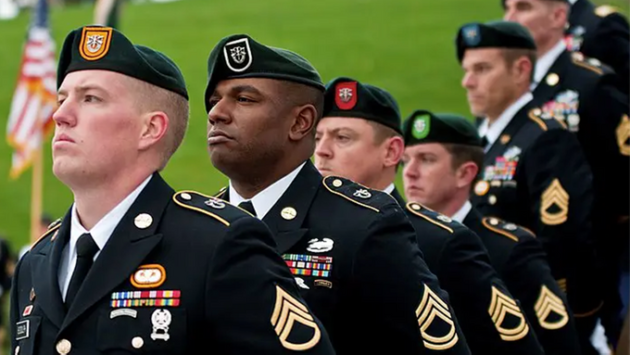1. The Navy SEALs
Like the marine mammals, they’re amphibious: It’s in the name, which stands for “Sea Air and Land. ” The SEALs began as several specialized Navy units created during World War II and the Korean War. But they branched out into their own official entity in 1962, shortly before training South Vietnamese troops to conduct secret river missions. But most people hadn’t heard of them until SEAL Team 6’s 2011 foray into Pakistan to kill 9/11 mastermind Osama bin Laden. Almost half of Navy recruits want to join the SEALs, but only 6 percent of those applicants meet the physical and mental requirements. Of those who make that first cut, three-quarters will wash out during training, which requires swimming 1,000 yards in less than 20 minutes and running 4 miles in 31 — not to mention proving one’s scuba diving prowess.
2. The Green Berets
One of the lesser-known legacies of President John F. Kennedy is his championing of the expansion of the U.S. Army Special Forces, which he dubbed the “ Green Berets.” The elite soldiers were so important to Kennedy that his family requested their presence within hours of his assassination, with 46 Green Berets traveling to Washington the next day to attend his funeral as part of his honor guard. The Green Berets cover everything from humanitarian assistance to anti-narcotics operations to psychological warfare. Like the SEALs, the selection process is brutal; they complete more than a year of grueling training, including a land navigation test where the recruits are made to survive for six days without help in the wilderness. There are about 7,000 active duty Green Berets.
3. The French Foreign Legion
While not American, you will find U.S. volunteers among its ranks. More than 9,000 men are enlisted in the legendary French expeditionary force, which accepts able-bodied men of any race, religion or nationality. In popular culture, many join “to forget” — a lost love, a criminal history or bad record with another country’s military. Those shady histories, plus their status as foreigners, has led some to call them “the expendables.” The Legion was first created by King Louis Philippe in 1831, and in 1883, a French general addressed legionnaire soldiers on their way to Northern Africa with the stirring call to arms: “You are soldiers meant to die.” The perks? Free food, free housing, free French classes, a salary that starts around $1,500 a month and the ability to start applying for French naturalization after three years of service. But nowadays recruitment standards include a background check, as the republic doesn’t want to arm just anyone.
4. Blackwater and Other Modern Mercenaries
Mercenaries have been a part of warfare since 2500 B.C., when they were first mentioned in the Amarna Letters — the reference to them was, well, less than pleasant (habiru, the word used for them, is related to “plunderer” or “murderer). The latest iteration has attracted many former special ops to private military companies, like the infamous “Blackwater,” started by former Navy SEAL Erik Prince and renamed “Xe Services” in 2009 and “Academi” in 2011 as it tried to shed its blood-spattered image. Shortly before leaving office, Trump pardoned four Blackwater contractors who opened fire on and killed 14 civilians in Iraq in 2007. In a historic first, soldiers from the Russian mercenary company Wagner face charges for war crimes committed in Syria after filming themselves killing an alleged Islamic State member in horrific fashion. Experts hope that the case will lead to more accountability for mercenaries operating globally.


Leave a Reply
You must be logged in to post a comment.